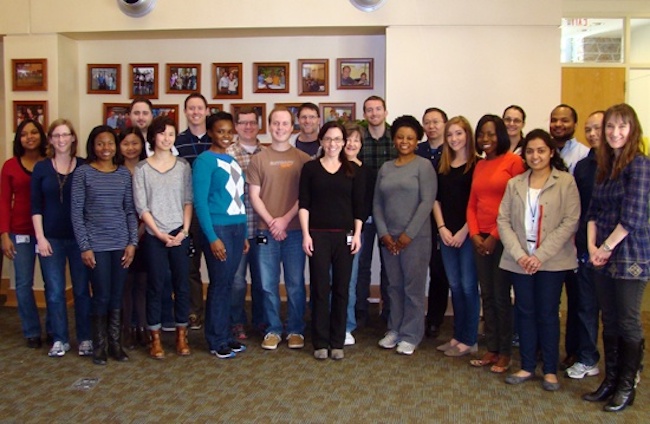Overview

The Laboratory of Immune Responses and Virology is led by Georgia Tomaras, PhD, Director of Research at the Duke Human Vaccine Institute. Dr. Tomaras' overall research program is to understand the cellular and humoral immune response to HIV-1 infection and vaccination that are involved in protection from HIV-1. Research in the Tomaras laboratory centers around the following three main projects:
- Antiviral CD8+ T cell responses in HIV-1 infection and post-vaccination
- Mucosal and systemic antibody responses to infection and vaccination in both non-human primates and humans
- The ontogeny of neutralizing antibodies in HIV-1 infection
Selected Achievements
Antiviral CD8+ T Cell Responses
We have developed a robust and high-throughput multi-clade virus inhibition assay for the measurement of functional CD8 T cell activity to decipher the mechanisms of virus inhibition that include both lytic and nonlytic mechanisms. We found that CD8+ T cell-mediated virus inhibition, like other memory CD8+ T cells, can use epigenetics to control the expression of inhibitory molecules so that they can control molecules released to target infected CD4+ T cells.
We found that CD8+ T cell antiviral activity from vaccinees and virus controllers were defined by CD107a and MIP-1β expression and that CD8+ T cell from all memory stages of differentiation exhibit antiviral activity, including transitional memory CD8+ T cells. Our data define attributes of an antiviral CD8+ T cell response that may be optimized in the search for an efficacious HIV-1 vaccine.
Mucosal and Systemic Antibodies
A critical time to study the initial immune responses to the transmitted/founder virus is the eclipse phase of HIV-1 infection. We have shown that the first detectable antibody response is in the form of HIV-1 virion-Ab complexes and the initial free antibody response is targeted only to the gp41 portion of the HIV-1 envelope. This body of work provided a deeper understanding of the initial B cell response to HIV infection that has allowed subsequent work to focus on why the humoral response is targeted initially to gp41 and not other potentially protective epitopes.
Moreover, this work is leading to more detailed analyses of the ontogeny of the initial B cell response and whether this pathway to an ineffectual antibody response impedes the elicitation of more protective responses. This is critical for defining what a vaccine must do differently from natural infection in stimulating the B cell response.
Heterologous Neutralizing Antibodies
We identified that 2F5-like antibodies can develop in chronic HIV-1 infection and can mediate neutralization breadth. As a result of this work, we continued to investigate the nature of the HIV-1 viruses that were most sensitive to HIV-1 gp41 MPER-mediated neutralization. We identified a single amino acid substitution in gp41 that leads to prolonged MPER exposure with implications for vaccine design.
Contact Us
Georgia Tomaras, PhD
106 Research Drive
Room 4079 MSRB II
Durham, NC 27710
(919) 681-5598
gdt@duke.edu
Publications and Funded Projects
View Dr. Tomaras's profile to see her publications and funded projects.
Lab Members
Faculty Members
Laboratory Staff
- Vicki C. Ashley (Laboratory Manager)
- R. Glenn Overman, MS (Laboratory Manager)
- Andrew Alin
- Mike Archibald
- David Beaumont
- Caroline Brackett
- Aaron Deal
- Stephanie Freel, PhD
- Yong Lin
- Pinghuang Liu, PhD
- Judith T. Lucas
- Sam McMillian
- Tara McNair
- Kate Medynskaya
- Shad Mosher
- Tamika Payne, PhD
- Matthew Reichartz
- Sheetal Sawant
- Kelly Seaton, PhD
- Xiaoying Shen, PhD
- LaTonya Williams
- Nicole Yates, PhD
